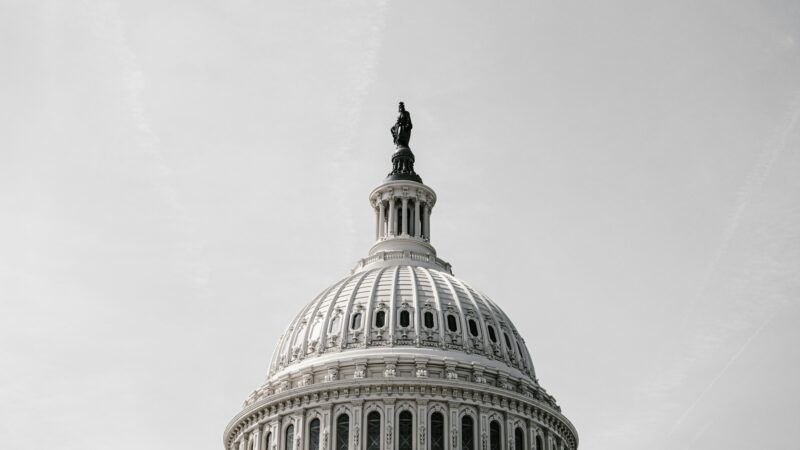Congress Must Vote on Tariffs
For both practical and constitutional reasons, this is the obvious way out of the chaos Trump's tariffs have created.

President Donald Trump's unilateral attempt at imposing tariffs has evolved into a quantum state.
You probably already know that Trump has repeatedly threatened, imposed, paused, delayed, raised, lowered, and "chickened out" on various tariff plans. In the past 48 hours, things got even crazier. The Court of International Trade blocked most of Trump's tariffs with an injunction issued Wednesday, but that injunction was temporarily paused by a federal appeals court on Thursday. Meanwhile, a second federal court also ruled Thursday that the tariffs are unlawful.
The tariffs, which constitute one of the largest tax increases in American history, are simultaneously active and unlawful, subject to change at the president's whim, and could be turned off once again within weeks (when the appeals court's temporary stay will be reviewed).
As of this moment, that means an American importer doesn't know whether it is due a refund for tariffs already paid, or whether it will owe more taxes for the next shipment of goods.
This is, obviously, no way to run tax policy.
The good news is that there's an equally obvious solution to this mess—a solution that's been available since the beginning of this whole insane saga.
Congress needs to vote on the tariffs. Now.
This is true for both practical and constitutional reasons. The practical one should be obvious enough, given all the tariff-related chaos that Trump has unleashed. The economy needs certainty, and Congress can provide that by approving whatever tariff package can get the necessary votes in both chambers—and by restricting Trump's ability to keep making changes.
For tariff advocates, the benefit of having a vote in Congress is putting an immediate end to the various lawsuits facing the administration's trade policies. In both lower court rulings that went against Trump, the judges did not say tariffs are unlawful. They said Trump did not have the authority to impose those tariffs, and that the power to do so rests with Congress.
That brings us to the constitutional argument. Article I, Section 8 spells it out in no uncertain terms: "The Congress shall have Power To lay and collect Taxes, Duties, Imposts and Excises."
Some members of Congress have been making this point for months. "Tariffs are taxes, and the power to tax belongs to Congress—not the president," is how Sen. Rand Paul (R–Ky.) likes to explain it. "Our Founders were clear: tax policy should never rest in the hands of one person."
The closest thing we've seen to an actual congressional vote on tariff policy was a Senate vote on a resolution Paul proposed to cancel the tariffs Trump imposed on Canada and Mexico. It passed 51–48 but has not received a vote in the House (more on that in a moment). Paul also offered a second resolution to cancel Trump's "Liberation Day" tariffs on nearly all imports, but that one failed because two senators likely to vote "yes" missed the vote.
Over in the House, Rep. Suzan DelBene (D–Wash.) and some of her Democratic colleagues have been trying to force similar votes. "Before Trump attempts to reformulate his tariffs under a different law, Congress must settle this issue once and for all by passing legislation to require the president to come to Congress before imposing sweeping tariffs," she said this week, following the court ruling that blocked Trump's tariffs.
The situation in the House has been made more complicated by Republican leaders, who have used a gimmick to block a proxy vote on the tariffs—along the lines of what Paul was able to force in the Senate. A resolution to cancel the supposed "emergency" underpinning the tariffs should be a privileged motion that can move directly to the House floor without going through committees. This is all a bit wonky, but the House Rules Committee has declared that, for the purposes of tariff resolutions, "days" on the House calendar are not actually days. As a result, DelBene's resolution is trapped in a sort of alternate dimension where time does not pass and therefore the proposal cannot be brought to the floor.
Like I said at the beginning, the tariffs are in a quantum state.
Congress could put an end to all of this insanity by writing a tariff bill and having a vote. You know, the way the system is supposed to work.
What would that bill look like, and what sort of tariffs could pass? I don't have a clue, but that's the beauty of democratic government: lawmakers would have to find a version of Trump's tariff policy that has majority support—or would have to admit that there is no such thing. That's how every other tax policy gets made. Tariffs aren't any different.
In a post on Truth Social on Thursday, Trump whined that the Court of International Trade's ruling this week "stated that I would have to get the approval of Congress for these Tariffs," which he said would "completely destroy Presidential Power."
Sorry, but no. That's simply what the Constitution requires. And, regardless, White House press secretary Karoline Leavitt claims the tariffs are part of the "mandate" Trump won from the voters last year. If so, then he should have no trouble getting a tariff bill through Congress. Plenty of other presidents have done that, and Trump is supposedly a great dealmaker.
American businesses should not have to live under a tax policy that's subject to change day by day and hour by hour. After Trump's legal defeats this week, the path forward on tariff policy should be clear. Congress must decide.


Show Comments (73)